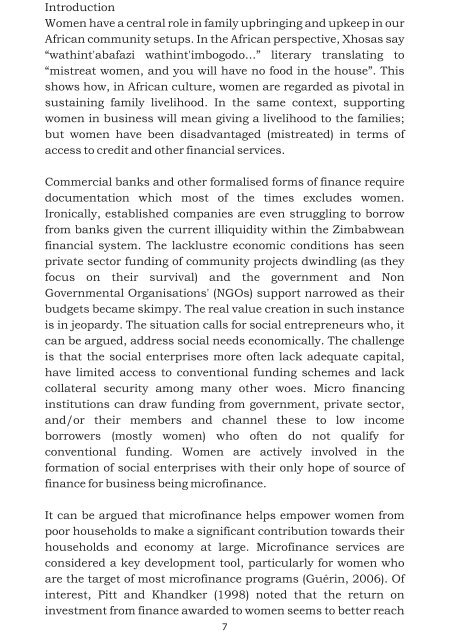Beneficiaries are actors too.pdf - Southern Institute of Peace ...
Beneficiaries are actors too.pdf - Southern Institute of Peace ...
Beneficiaries are actors too.pdf - Southern Institute of Peace ...
You also want an ePaper? Increase the reach of your titles
YUMPU automatically turns print PDFs into web optimized ePapers that Google loves.
Introduction<br />
Women have a central role in family upbringing and upkeep in our<br />
African community setups. In the African perspective, Xhosas say<br />
“wathint'abafazi wathint'imbogodo...” literary translating to<br />
“mistreat women, and you will have no food in the house”. This<br />
shows how, in African culture, women <strong>are</strong> regarded as pivotal in<br />
sustaining family livelihood. In the same context, supporting<br />
women in business will mean giving a livelihood to the families;<br />
but women have been disadvantaged (mistreated) in terms <strong>of</strong><br />
access to credit and other financial services.<br />
Commercial banks and other formalised forms <strong>of</strong> finance require<br />
documentation which most <strong>of</strong> the times excludes women.<br />
Ironically, established companies <strong>are</strong> even struggling to borrow<br />
from banks given the current illiquidity within the Zimbabwean<br />
financial system. The lacklustre economic conditions has seen<br />
private sector funding <strong>of</strong> community projects dwindling (as they<br />
focus on their survival) and the government and Non<br />
Governmental Organisations' (NGOs) support narrowed as their<br />
budgets became skimpy. The real value creation in such instance<br />
is in jeopardy. The situation calls for social entrepreneurs who, it<br />
can be argued, address social needs economically. The challenge<br />
is that the social enterprises more <strong>of</strong>ten lack adequate capital,<br />
have limited access to conventional funding schemes and lack<br />
collateral security among many other woes. Micro financing<br />
institutions can draw funding from government, private sector,<br />
and/or their members and channel these to low income<br />
borrowers (mostly women) who <strong>of</strong>ten do not qualify for<br />
conventional funding. Women <strong>are</strong> actively involved in the<br />
formation <strong>of</strong> social enterprises with their only hope <strong>of</strong> source <strong>of</strong><br />
finance for business being micr<strong>of</strong>inance.<br />
It can be argued that micr<strong>of</strong>inance helps empower women from<br />
poor households to make a significant contribution towards their<br />
households and economy at large. Micr<strong>of</strong>inance services <strong>are</strong><br />
considered a key development <strong>too</strong>l, particularly for women who<br />
<strong>are</strong> the target <strong>of</strong> most micr<strong>of</strong>inance programs (Guérin, 2006). Of<br />
interest, Pitt and Khandker (1998) noted that the return on<br />
investment from finance awarded to women seems to better reach<br />
7


